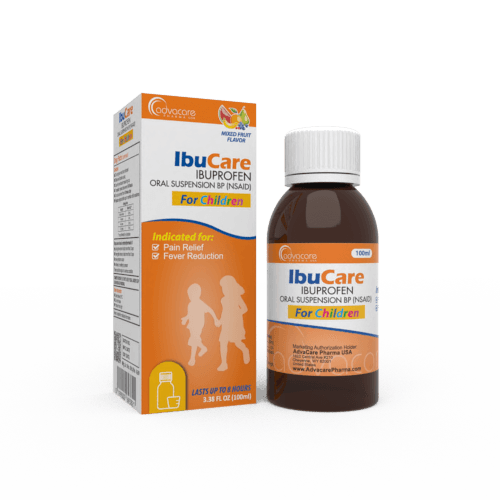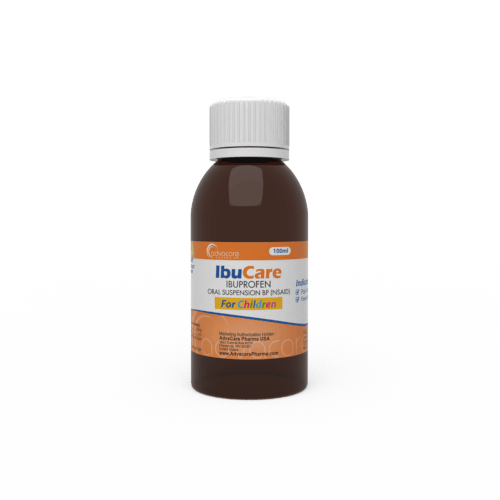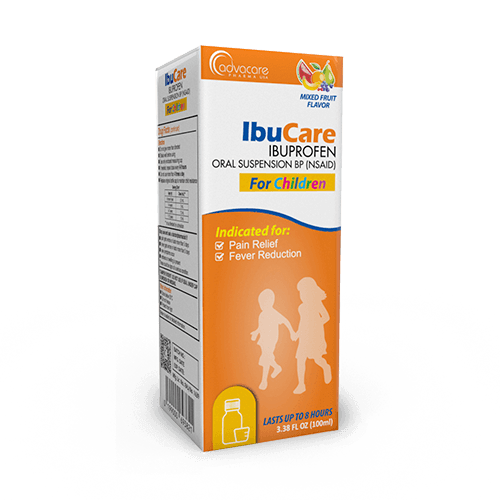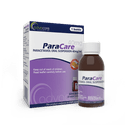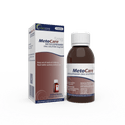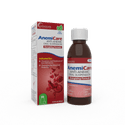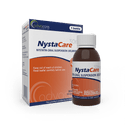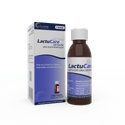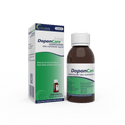- Home›
- Pharmaceuticals›
- Pharmaceutical Suspensions›
- Oral Suspensions›
- Ibuprofen Oral Suspension
Ibuprofen Oral Suspension
Dosage
Packaging
What is Ibuprofen?
Active Ingredients: Ibuprofen
Ibuprofen Oral Suspension is a non-steroid anti-inflammatory drug (NSAID) used to reduce pain and inflammation that is associated with migraines, dysmenorrhea, rheumatoid arthritis, osteoarthritis, and toothaches. Ibuprofen is also used to reduce fever and to treat symptoms of the cold and flu.
Ibuprofen is a non-selective inhibitor of cyclooxygenase (COX), which in turn lowers the level of prostaglandin in the body. Prostaglandin is a hormone responsible for pain sensation and inflammation. Due to this effect, Ibuprofen also has anticoagulant properties, as COX is typically converted into arachidonic acid (a vital component of platelet aggregation). The antipyretic effects may be due to Ibuprofen's effect on the hypothalamus.
Ibuprofen Oral Suspension's effectiveness as an analgesic and anti-inflammatory agent makes it a common choice for managing mild to moderate pain and inflammation. But it should be used with caution, particularly in users with existing gastrointestinal issues, as it can increase the risk of gastric irritation and bleeding. Long-term or high-dose use should be monitored due to potential risks such as kidney damage, increased blood pressure, and cardiovascular events. Avoid combining Ibuprofen with other NSAIDs or alcohol.
Individual responses to the medication can vary. Factors such as age, underlying health conditions, and concurrent use of other drugs can influence its effectiveness and safety. Users must follow the prescribed dosage and consult with a doctor for personalized advice, especially in cases of chronic use or when managing complex medical situations.
This product is certified by GMP standards. AdvaCare Pharma is a global supplier of Ibuprofen Oral Suspension. We excel at the production and distribution of high-quality yet cost-effective treatments. This medication is manufactured in our facilities located in China, India, and the USA.
Why are we a quality Ibuprofen manufacturer?
AdvaCare Pharma, a GMP-compliant pharmaceutical company, specializes in the manufacture of Ibuprofen Suspension. Our strategic manufacturing locations and innovative management systems ensure full control over the supply chain, resulting in enhanced quality standards and decreased costs throughout the production, transport and import processes. As a trusted Ibuprofen manufacturer, we globally supply a comprehensive range of 55+ oral liquid medicines in suspension dosage form to more than 65 countries.
Uses
What is Ibuprofen used for?
It is used to treat primary dysmenorrhea, rheumatoid arthritis, and osteoarthritis. In children over 6 months old, it is used to treat fever, pain, and juvenile arthritis.
How is Ibuprofen Oral Suspension used?
This medication is manufactured as a liquid to be taken orally.
What dose should be given?
The usual dose for adults is 600mg for headaches or 200 to 400mg for pain or fever.
For the treatment of fever in children, the usual dose for:
- 6 months to 11 years is 5mg/kg for fevers under 102.5 degrees Fahrenheit (or 39.2°C) and 10mg/kg for high fevers. The maximum dosage is 40mg/kg in a day.
- 12 years and older is 200-400mg, given every 4-6 hours.
For the treatment of pain in children, the usual dose for:
- 6 months to 11 years is 5-10mg/kg, given every 6-8 hours.
- 12 years and older is 500mg, given every 6-8 hours.
The exact dosage is dependent on medical condition, response to the treatment, age, and weight. Refer to a doctor or pharmacist for guidelines on dosage.
Does Ibuprofen Oral Suspension interact with food or beverages?
While there are no specific food restrictions while taking Ibuprofen Oral Suspension, it is recommended to take it with food or milk to minimize gastrointestinal irritation.
How quickly does Ibuprofen Oral Suspension begin to work?
The onset of action occurs within 30 minutes to an hour after ingestion. The peak analgesic and anti-inflammatory effects usually manifest within 1 to 2 hours.
Can Ibuprofen Oral Suspension be used during pregnancy?
Ibuprofen Oral Suspension is generally not recommended during pregnancy, especially in the third trimester. It can lead to closure of the ductus arteriosus in the fetus and may inhibit labor. Use during the first two trimesters should be based on a doctor's advice, considering the potential benefits and risks.
Is Ibuprofen Oral Suspension safe for breastfeeding mothers?
While Ibuprofen is considered relatively safe for breastfeeding mothers, as only small amounts are excreted in breast milk, it should still be used with caution. Nursing mothers should consult with a healthcare provider before using the drug to ensure it is safe for both the mother and the infant.
Can Ibuprofen Oral Suspension be used in elderly patients?
Yes, it can be used in elderly patients, but with caution. Older adults are more susceptible to the adverse effects of NSAIDs, including gastrointestinal bleeding and kidney impairment. Dose adjustments and close monitoring may be necessary for this age group.
Can Ibuprofen Oral Suspension be used concurrently with other NSAIDs?
Using this drug with other NSAIDs is not recommended, as it increases the risk of gastrointestinal bleeding and other potential side effects.
Is Ibuprofen Oral Suspension effective in treating chronic conditions?
While the drug is effective in managing symptoms of chronic conditions such as rheumatoid arthritis and osteoarthritis, it does not cure these diseases. It is used for symptomatic relief of pain and inflammation associated with these conditions, but ongoing management and treatment should be guided by a medical professional.
Can Ibuprofen Oral Suspension affect cardiovascular health?
Like other NSAIDs, this drug has been associated with an increased risk of heart attack and stroke, especially when used in high doses or for long-term treatment. This risk may be higher in individuals with pre-existing cardiovascular conditions.
Is Ibuprofen Oral Suspension appropriate for individuals with asthma?
Individuals with asthma, especially those with aspirin-sensitive asthma, should use this medication cautiously. Ibuprofen may trigger bronchospasm or exacerbate asthma symptoms. Asthmatic patients are advised to consult with a healthcare provider before using.
How does Ibuprofen Oral Suspension affect blood clotting?
This drug can inhibit platelet aggregation due to its effect on cyclooxygenase enzymes, which play a role in blood clotting. This can lead to a mild anticoagulant effect, increasing the time it takes for blood to clot. Patients with bleeding disorders or those on anticoagulant therapy should use this drug with caution and seek medical supervision.
Can Ibuprofen Oral Suspension be used for long-term pain management?
Ibuprofen Oral Suspension is typically used for short-term relief of pain and inflammation. For long-term use, especially in chronic conditions like arthritis, alternative treatments or a combination of medications might be recommended.
How should Ibuprofen Oral Suspension be stored?
This drug should be stored at room temperature, away from light and moisture, and out of reach of children. The bottle should be tightly closed when not in use. Discard any unused medication after the expiration date or if it appears cloudy or discolored.
Side Effects
As with all pharmaceuticals, some unwanted effects can occur from the use of Ibuprofen Oral Suspension.
Common side effects include, but may not be limited to:
- heartburn
- rash
- excessive gas
- nausea or vomiting
- dizziness
Seek medical attention if the following develop:
- confusion
- black or tarry stool or blood in vomit
- hypertension
- unusual swelling in the ankles
- changes in urination
Prolonged use or high doses of Ibuprofen may increase the risk of developing gastric erosions or ulcers. These are areas of damage to the stomach lining that may cause bleeding, pain, or discomfort.
For a more comprehensive list of all side effects from the use of this drug, consult a doctor or pharmacist.
If any of the common side effects are experienced while taking Ibuprofen Oral Suspension, monitor these symptoms and consult with a healthcare provider if they persist or worsen. The more severe side effects require immediate medical attention. If any new symptoms appear, please call the doctor.
Precautions
Do NOT use Ibuprofen Oral Suspension if:
- You are allergic to Ibuprofen or other NSAIDs.
- You have heart, liver, or kidney disease.
- You smoke tobacco.
- You have asthma, high blood pressure, high cholesterol, or diabetes.
Drinking alcohol when taking Ibuprofen may increase the risk of stomach bleeding. This can exacerbate the drug's irritating effects on the stomach lining, potentially leading to gastritis or ulcer formation.
Among the drugs which may interact with ibuprofen are ACE-Inhibitors, aspirin, diuretics, lithium, methotrexate, and warfarin. The interaction between Ibuprofen and ACE inhibitors can lead to decreased effectiveness of the latter, potentially reducing their ability to lower blood pressure and increasing the risk of kidney problems.
Concurrent use of Ibuprofen with diuretics can reduce the diuretic effect and lead to kidney damage. When Ibuprofen is taken with medications like lithium, methotrexate, or warfarin, it can increase the levels of these drugs in the blood, heightening the risk of toxicity and bleeding (in the case of warfarin). Doctors should exhibit caution when prescribing Ibuprofen for patients taking anticoagulants, as the combined use may cause bleeding.
Regular use of this medication can also lead to an elevation in blood pressure, which can be particularly concerning for individuals with pre-existing hypertension. Patients with high blood pressure should monitor their levels closely.
Breastfeeding while using ibuprofen is unclear whether it could harm a nursing baby. Consult a doctor or healthcare professional before treatment.
References
Antipyretic Efficacy and Safety of Ibuprofen Versus Acetaminophen Suspension in Febrile Children: Results of 2 Randomized, Double-Blind, Single-Dose Studies
This publication included two blinded single-dose studies randomized children 6 months to 11 years old with fever to receive ibuprofen (IBU) pediatric suspension 7.5mg/kg or acetaminophen (APAP) suspension 10 to 15mg/kg.
The main measure of effectiveness was the time-weighted sum of temperature differences (TWSTD) from baseline to 8 hours in each study. Secondary measures included TWSTD from baseline to 6 hours, the time it took for temperature control to start and how long it lasted, and the percentage of participants who achieved temperature control. Analyses conducted after the studies combined data to look at effectiveness and adverse events.
IBU showed better results than APAP for the main effectiveness measure (both P < .001). Both individual and combined analyses of secondary effectiveness measures showed significant benefits (P < .05) of IBU over APAP.
The conclusion of this study is that IBU pediatric suspension was more effective at reducing temperature in febrile children compared to acetaminophen.

You might be interested in...
Why AdvaCare Pharma?
As an industry leader, we are aware of our responsibility to provide affordable and sustainable solutions to improve healthcare worldwide.
